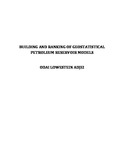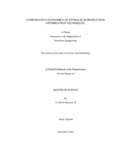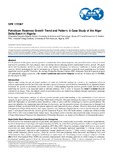Deepwater Petroleum Exploration and Production in the Gulf of Guinea: Comparative Analysis of Petroleum Fiscal Systems Performance
Thesis
Petroleum Fiscal System (PFS) is a major determinant of investment decision in the exploration and production of oil and gas in any country. It basically describes the profitability relationship between the host government of the producing community and the International Oil Companies (IOCs). The comparative analysis of the performance of the fiscal regimes becomes imperative as it affects the interest of the investor and the production of oil and gas. During the formulation of any fiscal regime a premium is placed on its outcome. In this study, Petroleum Fiscal System (PFS) deepwater economic model is developed for the Gulf of Guinea. The approach incorporates a dynamic multipurpose input data page that automatically considers fiscal laws, taxation and stochastic analysis. Monte Carlo simulation using @risk software is used to account for risk and uncertainties in decision making. This study addresses the industry structure, conduct and performance of fiscal regimes of countries in the Gulf of Guinea. Comparison of the effects of production delay, front ended government take, front loading index, and taxation show that the Gulf of Guinea is internationally competitive in all ramifications. A wide range of profitability indicators were used in the economic evaluation decision of this work such as Government Take (GTake), Contractor Take (CTake), Net Present Value (NPV), Internal Rate of Return (IRR), Profitability Index (PI), Savings Index (SI), Return on Investment (ROI), Payout Time (POT), Effective Royalty Rate (ERR), Growth Rate of Return (GRR), Discounted Net Cash Flow (DNCF), Front Loading Index (FLI). This avails investors, governments, petroleum economists, and so on great options of economic performance indicators in decision making. It is also found that as the risk in deepwater investment increases with water depth, return on investment rises significantly too in the Gulf of Guinea. Analysis of all terms contained in the deep water economic model formulated (stochastic and deterministic) presents a useful tool to guide in investment decision making in the Gulf of Guinea. Recommendations on how the variations would give government equal take on any Petroleum Fiscal System are made. Usually the aim of the host government is to get as much economic rent as possible.
http://library.aust.edu.ng:8080/xmlui/handle/123456789/485



